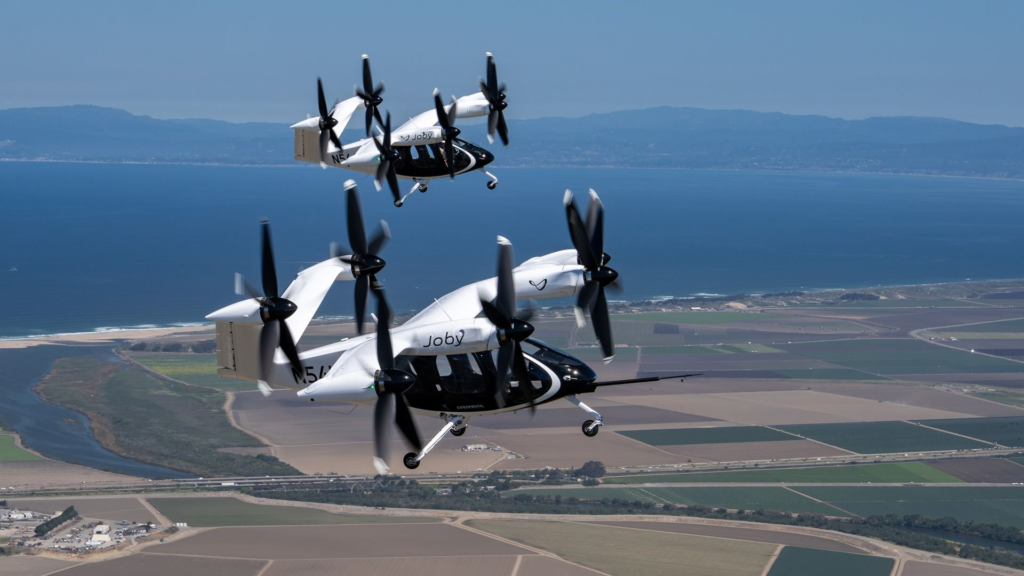Shares of US-based electric vertical takeoff and landing (eVTOL) manufacturer Joby Aviation fell by 12.43% in the last five days as competition intensifies in the race to bring air taxis to commercial service. Joby’s shares are currently trading at $16.28.
The slump occurred after the California-based company announced on October 7, 2025, that it planned to raise $514 million through the sale of 30.5 million shares at $16.85 each, representing a 10.9% discount to the stock’s previous closing price. Joby has been developing an all-electric, piloted S4 eVTOL aircraft, capable of carrying four passengers at speeds of up to 200 mph and covering a maximum of 150 miles per charge.
Capital Raised To Fuel Certification And Commercial Launch
Joby Aviation said it plans to use the money raised from the share sale, along with its existing cash and investments, to fund aircraft certification and manufacturing, prepare for commercial operations, and cover general business expenses.
The offering closed on October 9, 2025. The gross proceeds from the offering, before deducting underwriting discounts and commissions and other offering expenses payable by Joby, were approximately $591 million, according to the company’s announcement.
This news comes as eVTOL manufacturers race for certification and market entry to meet the growing demand for clean, fast urban transportation. Other eVTOL companies, including Archer Aviation and Wisk Aero, among others, are also competing to capture a share of this emerging market. Joby aims to enter commercial service with its S4 eVTOL in early 2026.
Joby Aviation’s Share Performance Over Recent Months
Over the past year, Joby Aviation’s stock has surged more than 170%, delivering strong returns to shareholders in an otherwise challenging financial environment. The rally began in July 2025, when Joby’s share price climbed from a range of $7–$8 to $10.55.
By August 2025, the stock had continued its upward momentum, reaching a peak of $20.39, its highest valuation to date. Interestingly, financial analysts have pointed out an important caveat: Joby Aviation currently generates no revenue. While this may seem concerning at first, it also shows that investors have confidence in the company’s prospects.
In comparison, Archer Aviation’s shares have performed more modestly, though they have still gained about 65% over the past six months. Archer shares are currently trading at $11.97.
Joby’s Plans For The Next Phase Of Development
Joby has completed Stage 3 of the FAA’s five-stage type certification process and is now roughly 70% through Stage 4. With only Stage 5 remaining (final paperwork and issuance of the type certificate), the company is moving closer to approval. In August 2025, Joby began final assembly of its first conforming aircraft for Type Inspection Authorization (TIA) flight tests. This aircraft will undergo a comprehensive series of evaluations, including bench, ground, environmental, and lightning tests, to ensure full compliance with FAA standards.
Joby has been developing an all-electric, piloted eVTOL aircraft capable of carrying four passengers at speeds of up to 200 mph (322 km/h) and covering a maximum of 150 miles (241 km) per charge (depending on the aircraft’s weight). According to the company, this range is sufficient for over 99% of urban routes in cities like New York and Los Angeles, allowing for high aircraft utilization.
Additionally, the company is looking to expand into the international market. Looking ahead, Joby plans to launch passenger air taxi services in Ras Al Khaimah by 2027 and is preparing for operations in Dubai next year. The company also showcased its aircraft at Expo 2025 in Osaka, Japan, in collaboration with ANA Holdings. Recently, Joby has also completed its first piloted flight in FAA-controlled airspace with other aircraft, performing a 12-minute flight between two California airports. The company’s air taxi flew between Marina Municipal Airport (OAR) and Monterey Regional Airport (MRY) over a distance of 10 nautical miles.


